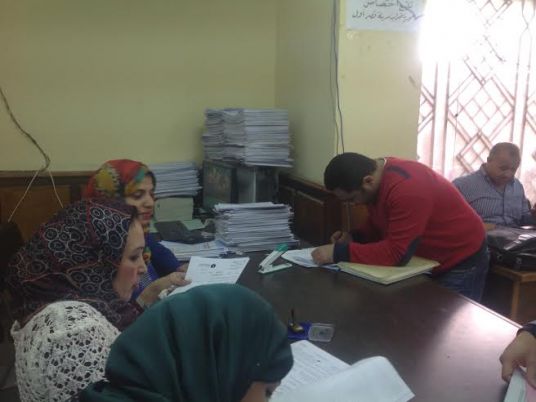A dozen disabled people protesting near the cabinet building on Monday threatened to set themselves on fire unless an official agreed to meet with them and hear their demands on rights and opportunities for Egypt’s disabled community.
One man, Lotfy Mohamed, a 24-year-old graduate from the faculty of commerce at Cairo University, doused himself in gasoline in preparation for self-immolation, before being allowed through a police cordon, with a promise that one representative from among the group would be allowed to talk with a government official.
After waiting for two hours, the group stepped up their demand, refusing to speak with anyone but Prime Minister Essam Sharaf.
The protesters had been holding an open-ended sit-in since Wednesday of last week, hoping to meet with an official from the cabinet and present their ten demands, all of which are aimed at improving the lot of the disabled through government initiatives and support.
The demands, as listed on flyers being distributed, include the provision of job opportunities through government schemes; an increase in the quotas for hiring disabled people into government service from five percent to ten percent; the provision of transportation capable of accommodating the disabled; and free apartments for disabled married couples.
The same flyers stated that disabled people were involved in the revolution, but that they are still marginalized and aren’t able to cope with their difficult circumstances, which is why they had decided to go out into the streets and claim their rights.
“We decided to commit suicide yesterday,” said Mohamed, explaining that the group had made the desperate decision after a car belonging to a government minister had allegedly driven into them.
“We were protesting in front of the cabinet and blocking the street leading to Qasr al-Aini Street, when a minister’s black Mercedes broke through the protest and took me and Mohamed [Sayed] onto the hood of the car. It was driving really fast. He could have killed us,” said Mohamed.
“When the official, who is supposed to solve our problems, is mowing us down with his car, then there is no hope in life,” added Mohamed Sayed, one of the organizers of the protest, who was also hit by the vehicle.
Protesters claim that there are no statistics on the number of disabled people in Egypt. Many of the disabled are university graduates and appear to be qualified for employment. Several NGOs have been established with the aim of helping them, but without government assistance, little headway has been made, said the group’s organizers.
“I want to work. I don’t want to beg. That is my most basic right,” said one of the protesters.
As of Monday evening, the group was continuing its sit-in, still waiting for Sharaf to respond to its request for a personal meeting. Their threat of self-immolation still stands, they say, if they are not given a fair hearing.
“We won’t be considered suicidal. We will be considered martyrs, because we will ignite a second revolution,” said Ashraf, a paraplegic, who was a worker at Minya University for over 19 years, but was fired after asking for sick leave.




